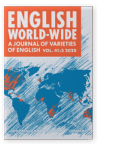Hongkongites, Hong Kongers, Hong Kong Belongers?
Tracing identity (re)constructions in news discourse in Hong Kong from 1903 to 1999
To find empirical evidence for Schneider’s (2007) periodisation for the
emergence of Hong Kong English, Evans (2014, 2015) scrutinised various historical documents, such as newspapers, council proceedings and jury lists. Taking the
increasing use of the terms Hongkonger and Hongkong people during the 1980s as evidence for the
emergence of a new Hong Kong identity, he argued that the Chinese population considered themselves part of the community. This
paper systematises Evans’ (2014) approach by analysing terms denoting ingroup and
outgroup members in English news discourse in Hong Kong from 1903 to 1999. By tracing changes in frequency, reference and
discourse topics associated with the terms, periods of identity reconstructions are uncovered and Schneider’s and Evans’
periodisations reassessed. The study thus contributes to our understanding of the social dynamics in Hong Kong’s history, which
are considered key to the emergence of Hong Kong English.
Article outline
- 1.Introduction
- 2.The emergence and status of Hong Kong English
- 3.Newspaper discourse and identity (re)construction
- 4.Method
- 5.Analysis of demonyms
- 5.1Bird’s eye perspective: Frequency
- 5.2Focus on the ingroup: Hongkongite and Hongkonger
- 5.2.1Reference
- 5.2.2Discourse topics: Hongkongite and Hongkonger
- 5.3Focus on the outgroup: Mainlander
- 5.3.1Reference
- 5.3.2Discourse topics: Mainlander
- 5.4Summary of results
- 6.Discussion
- Before the Japanese occupation
- Impact of the Japanese occupation
-
After the Japanese occupation
- Impact of the Joint Declaration
- 7.Conclusion
- Notes
-
Sources
-
References
References (32)
Sources
ProQuest Historical Newspapers: South China Morning Post
Publication title: South China Morning Post (1903–1941)
. Retrieved from
[URL].
ProQuest Historical Newspapers: South China Morning Post
Publication title: South China Morning Post (1946-Current)
. Retrieved from
[URL].
Bacon-Shone, John and Kingsley Bolton
2008 “
Bilingualism and Multilingualism in the HKSAR: Language Survey and Hong Kong’s Changing Linguistic Profile”. In
Kingsley Bolton, and
Han Yang, eds.
Language and Society in Hong Kong. Hong Kong: Open University of Hong Kong Press, 25–51.

Benson, Phil
1994 “
The Political Vocabulary of Hong Kong English”.
Hong Kong Papers in Linguistics and Language Teaching 171: 63–81.

Biewer, Carolin, Lisa Lehnen, and Ninja Schulz
Bolton, Kingsley
2002 “
The Sociolinguistics of Hong Kong and the Space for Hong Kong English”. In
Kingsley Bolton, ed.
Hong Kong English: Autonomy and Creativity. Hong Kong: Hong Kong University Press, 29–55.

Boyle, Joseph
1997 “
Changing Attitudes to English”.
English Today 131: 3–6.


Chiu, Way-Yee T.
1994 “
The Newspaper Industry in Hong Kong: A Strategic Analysis”. MBA Dissertation, University of Hong Kong.


Collins, Peter
2009 “
Extended Uses of Would in Some Asian Englishes”.
Asian Englishes 121: 34–46.


Evans, Stephen
2011 “
Hong Kong English and the Professional World”.
World Englishes 301: 293–316.


Evans, Stephen
2014 “
The Evolutionary Dynamics of Postcolonial Englishes: A Hong Kong Case Study”.
Journal of Sociolinguistics 181: 571–603.


Evans, Stephen
2015 “
Modelling the Development of English in Hong Kong”.
World Englishes 341: 389–410.


Evans, Stephen
2016 The English Language in Hong Kong: Diachronic and Synchronic Perspectives. Houndmills: Palgrave Macmillan.


Garrett, Peter
2010 Attitudes to Language. Cambridge: Cambridge University Press.


Gisborne, Nikolas
2000 “
Relative Clauses in Hong Kong English”.
World Englishes 191: 357–371.


Greaves, Chris and Martin Warren
2007 “
Concgramming: A Computer Driven Approach to Learning the Phraseology of English”.
ReCALL 191: 287–306.


Gu, Mingyue
2011 “
Language Choice and Identity Construction in Peer Interactions: Insights from a Multilingual University in Hong Kong”.
Journal of Multilingual & Multicultural Development 321: 17–31.


Hamlett, Tim
1997 “
English in Hong Kong: The Future”.
English Today 131: 10–11.


Hutcheon, Robin
1983 SCMP, the First Eighty Years. Hong Kong: South China Morning Post, Publications Division.

Joseph, John E.
1999 “
Ex-Colonial Language Post-Colonial Identity: The Future of English in Hong Kong”. In
Fritz-Wilhelm Neumann, ed.
Proceedings Anglistentag 1998 Erfurt. Trier: Wissenschaftlicher Verlag, 405–414.

Lai, Mee-Ling
2001 “
Hong Kong Students’ Attitudes Towards Cantonese, Putonghua and English After the Change of Sovereignty”.
Journal of Multilingual and Multicultural Development 221: 112–133.


Lai, Mee-Ling
2005 “
Language Attitudes of the First Postcolonial Generation in Hong Kong”.
Language in Society 341: 363–388.


OED Online
Oxford: Oxford University Press
[URL] (accessed December 22, 2019).
Pang, Terence T. T.
2003 “
Hong Kong English: A Stillborn Variety?”.
English Today 191: 12–18.


Riggins, Stephen H.
1997 “
The Rhetoric of Othering”. In
Stephen Harold Riggins, ed.
The Language and Politics of Exclusion: Others in Discourse. Thousand Oaks: Sage, 1–30.

Schneider, Edgar W.
2003 “
The Dynamics of New Englishes: From Identity Construction to Dialect Birth”.
Language 791: 233–281.


Schneider, Edgar W.
2007 Postcolonial English: Varieties Around the World. Cambridge: Cambridge University Press.


Schneider, Edgar W.
2014 “
New Reflections on the Evolutionary Dynamics of World Englishes”.
World Englishes 331: 9–32.


Scollon, Ron
1997 “
Hong Kong Newspapers on the Pre-Transitional Stage”.
Asia Pacific Media Educator 21: 48–59.

Setter, Jane, Cathy S. P. Wong, and Brian H. S. Chan
2012 Hong Kong English. Edinburgh: Edinburgh University Press.

Cited by (1)
Cited by 1 other publications
Biewer, Carolin, Lisa Lehnen & Ninja Schulz
This list is based on CrossRef data as of 4 july 2024. Please note that it may not be complete. Sources presented here have been supplied by the respective publishers.
Any errors therein should be reported to them.
